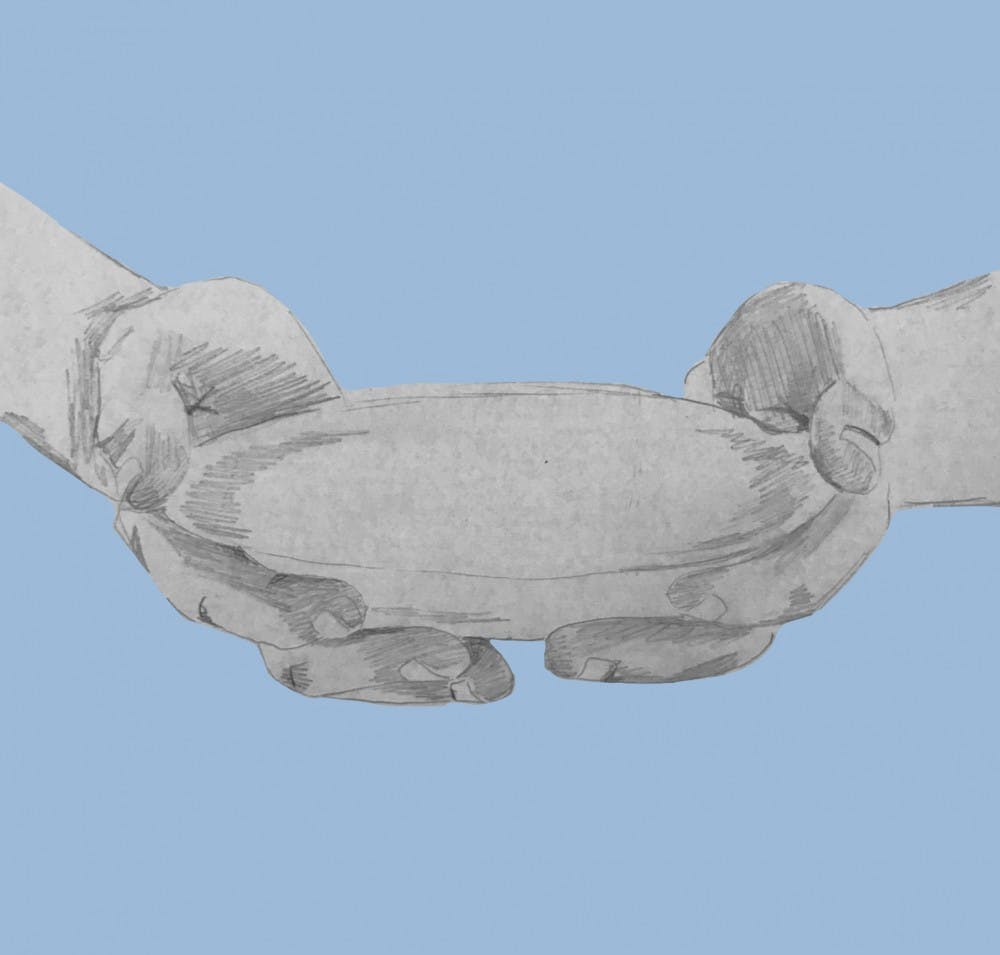Dad cooked, Mom cleaned—that’s the way things were in my house. But, then my Dad got sick, and the way we thought about food in my house changed. At first, trips to the Greek grocery store were replaced with trips to hospitals. Eventually, Sunday dinner was eaten in the hospice cafeteria, and when there was no more Dad, take-out dinners were all my single, working mother of three could handle.
Until one day, my Mom came home from work gripping a little blue notebook. It was filled with recipes her coworkers had collected for her, each page a handwritten account of what someone’s dining room table looked like on any given weekday. Inside we found instructions from her Guyanese coworker on how to make curry goat tucked next to a recipe for chicken soup from her supervisor’s mom. Despite the small size of the notebook, its pages were filled with potential— it was a new chapter for my mom, a chance for her to remarry food and joy in our house.
But the thought of cooking could only bring me back to the last time that I ate my Dad’s food. The last time I ate dinner made by him was the last time my family ever felt normal. It was the Monday of his accident, and were eating Sunday’s leftovers for dinner. What seemed like a minor car accident led to grim report after grim report by doctors, and what seemed like standard Monday evening leftovers turned into our last home cooked meal for months to come.
The cookbook was supposed to change that. The first thing we decided to attempt was a pot roast, a recipe shared by one of the nurses at my Mom’s job. It was clear my Mom was nervous—she never cooked, and there was added pressure to make this good. I saw her carefully follow the recipe: seasoning the meat and garnishing the pyrex dish with herbs, veggies, and potatoes. We put the dish in the oven, an oven that had been left cold for what felt like years, and set a timer.
Halfway through, my Mom went downstairs to check on the meat and I heard a huge crash followed by a scream. I raced downstairs and saw my mom standing in the kitchen, oven mitts on, with a mixture of broken pyrex and food littered across the floor. The pan had shattered right in her hand as she took it out of the oven. I saw in her eyes how hurt she was; I saw her shrink in front of the challenge that cooking was, and I saw her doubt her ability to be two parents at once. She looked up at me and meekly said, “It broke,” and then she burst into tears.
We ordered pizza that night. Later that month we replaced both stoves in our kitchens and remodeled our dining room–we never used the cookbook again. A food’s character is more than its ingredients— it’s the way the table you sit at creaks under pressure, or the way someone’s hands gather the ingredients, or how many layers of grease are caked into a cast iron skillet. We got rid of everyone else’s cooking influence and started fresh: a new stove to cook new foods on, a new table to try new dishes at, and a clean mentality to create new flavors with.
Sure, my mom still isn’t the best cook today, but at least I know that it’s 100% authentic to her. She doesn’t try to make the elaborate things my dad used to make, or get experimental with ingredients from foreign countries, but she’s comfortable in our kitchen. We haven’t forgotten the way things used to be, or the way my Dad’s food used to taste, but we have opened up our minds and hearts to a new kind of dining and a new version of mom— someone who is both a father and a mother, just not the way we thought she would be.







